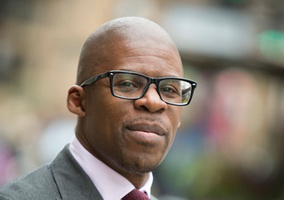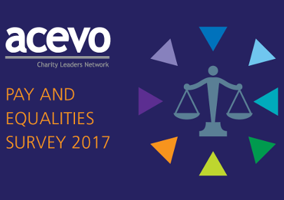I’m a white, privately educated, middle-class man who went to a top-rated university. I’m also the chief executive of Leap Confronting Conflict, a national charity that supports young people to manage conflict and to lead themselves and others.
The chances of me becoming Leap’s CEO were, frankly, stacked in my favour. At every stage of my life, though originally I didn’t know it, it was easier for me than it was for a person of colour with comparable qualifications, experience and ability to get into school and university, be shortlisted for jobs and to get them.
There is enough strong evidence that this is true for white people in the UK. This autumn the government launched a website documenting the extent of disadvantage related to ethnicity and culture, known as the Race Disparity Audit. There’s an early chapter in Reni Eddo-Lodge’s book, Why I’m No Longer Talking To White People About Race, which has a very clear breakdown of the barriers that people of colour have to overcome to have a chance to thrive.
I was, and remain, less likely to be arrested for adolescent low-level criminal behaviour, be caught up in violence, be stopped at airports and followed around stores. This I know because my husband, who I’ve been with for over 20 years, is black. Normally security staff pay me little or no attention. When I’m with him, we’re more likely to be followed around stores, be stopped at Customs and be questioned by police.
Here’s a snapshot of some of the shocking scale of the disparity:
- In 2015/16, black Caribbean pupils were permanently excluded at three times the rate of white British pupils
- Black people are over six times more likely to be stopped and searched than white people
- Black people are over three times more likely to be arrested than white people
Notwithstanding that I work hard, my life has not been played out on a level field. I have had a constant, unearned and unfair advantage. It is not enough for me not to be racist. To address this blatant and destructive unfairness, I have to be actively anti-racist.
Of course, I also experience privilege on account of being a man, middle class and having an English heritage. White women, white immigrants, white working-class people and those with disabilities all face barriers that I don’t. But this article is about race.
What I’ve written is not only about privilege, it also concerns prejudice. I experience privilege, other people experience prejudice: related but distinct issues. I’m not ignoring the prejudice that I’ve experienced because I’m gay; my awareness of my privilege has grown because of my personal experiences of other people’s fear and bigotry. Yet it doesn’t compare to the prejudice faced by people of colour, nor the experience of gay men of colour.
Changing attitudes
Us white chief executives need to have a chat. Racism is a form of social exclusion – at least from swathes of mainstream society. Our sector, at its best, can tackle the most severe kinds of social exclusion. Those at the most extreme margins of our society, through their own talent and potential but also in part through our sector’s great work, have been able to overcome many barriers and be active members of our economy, communities and political life.
Think about gay men: in the 90s, only 20 years ago, when I was working in the UK’s HIV sector, we were vilified, thrown out of our families and homes, summarily sacked, and persecuted with legislation like Clause 28. Now, I can be a CEO of a national charity on an issue largely unrelated to my sexuality and it’s not even worthy of comment. Stonewall, Outrage, Terrence Higgins Trust and other organisations created much of that seismic change; most were led by gay women and men. Not to say, of course, that there isn’t homophobia today, but there’s no doubt our sector can achieve extraordinary shifts for excluded people.
Leading by example
Leap Confronting Conflict is a diverse organisation; about half of our trustees, staff, and freelance trainers are black, Asian and from minority ethnic backgrounds. Our senior management team? Not so much. Fairly regularly, I hang out with about 30 or more chief executives of other youth organisations. One of us is black and he only became a CEO in the last year.
If our sector cannot demonstrate diversity in its leadership, then we’re not in a position to challenge the rest of society to improve. The recent Charity Commission report on diversity in our sector’s leadership revealed that the majority of trustees are white (92 per cent), older and above average income and education. And in this year’s Chief Executives Survey from Charity Finance, of the 60 chief executives who gave their ethnicity, 49 gave their ethnicity as white British, more than 80 per cent. Five others gave their ethnicity as white other, European or Irish. Four were of Asian origin and two of African origin.
Diversity at Leap has brought amazing benefits to our creativity, performance, design of our programmes and success in helping a greater diversity of young people to unleash their talent and potential. And, everyone has a deeper understanding of other people’s experiences, which is powerful personal growth.
Yet, improving diversity in our organisations is only part of the solution. We work hard to make sure people are treated equally, and sometimes we still get it wrong.
My husband told me a few months ago that whenever he’s on public transport, white people avoid sitting next to him. When I mention this to black people, they, not surprisingly, do not bat an eyelid. When I mention it to white people, they’re astonished and, sometimes, wonder whether he’s mistaken (the relevance of Reni Eddo-Lodge’s book title is stark). About a month ago, I was tired and on my way home. I got off the tube and then on to my bus; there were two empty seats and after I’d sat down I realised I’d sat down next to a white man and not a black man. Surprised, I checked myself and realised I’d felt threatened by the black guy but when I looked at him there wasn’t anything about him that I found threatening. Apart from, apparently, his skin colour.
Subconscious prejudice
It’s important to know that our subconscious mind makes most of our decisions. White people not only need to understand the dynamics of our privileges, but to be honest that hidden beyond our concepts of ourselves sit a range of prejudices we have absorbed. We grow up and live in a majority world with constant messages – some subtle, some blatant – about difference.
Even at Leap, which is diverse, it may not feel safe for people of colour to speak their mind. In 1903, W. E. Dubois published The Souls of Black Folk in which he describes “double consciousness”. This is the state of mind for a black person to work out how they feel and then to work out how to express that so they don’t get stereotyped: when a white man is angry, that’s all he is, when a black man is angry he’s ‘dangerous’.
In our organisations these dynamics will be at play in recruitment, in the way in which we listen to people, in how programmes are designed. Yet, the expertise that can only come from lived experience is crucial to our programmes’ successes. Considering the expertise from lived experience as valuable as professional expertise is a game-changer. This can fundamentally change us from well-meaning to impactful. At Leap when we talk about ‘lived experience’ we are not exclusively referring to race, although that is the focus of this article. Also most of our staff with lived experience are also technically expert and accredited.
Of course, social exclusion has a big part to play in Leap’s work – those for whom conflict turns into destructive behaviour are more likely to be from excluded backgrounds. There’s a strong link. The value that those in our team from those backgrounds play in designing our work, recruiting participants and contributing to our strategy is a significant part of Leap’s success.
It might be tempting to think that it’s right, therefore, that Leap should pay attention more than other organisations to racism and social exclusion. Consider, for example, a health charity – nearly all illnesses affect people no matter their background, so why should engaging people of colour in an organisation be important? Black British people are six times more likely to be sectioned under the Mental Health Act; if you’re a black woman, it’s higher. They are more likely to have poorer health outcomes when struck by illnesses. That’s why. Racism affects most aspects of life.
What to do about it
So here are some thoughts about how to get the best for people who are excluded:
- Let’s increase the volume and frequency of this conversation – I and some of my youth sector CEO mates are going to start; get in touch with me if you want to be part of it, whatever your ethnicity.
- If you are a white CEO, face up to the likelihood that you are prejudiced: once you do, you’ll get more practised at bringing your subconscious biases into the light and be able to tackle them more effectively and quickly. You’ll also achieve more impact in your work.
- Find ways to recruit more people of colour and with lived experience into your teams – the diversity of the team is important. Strive to make this true of your trustees and senior team; the modelling is crucial.
- Find mentors for team members to increase the likelihood of succession into more senior roles.
- Build awareness in your teams of racism and privilege and the subtle ways in which it operates. Try to build safe spaces in which to have dangerous conversations where people can learn from each other, and understand that people who have less cultural protection may protect their privacy more strongly. Leap can help to create these spaces in which it’s OK to ask clumsy questions and get things wrong – you’ll need ground rules and permission. We like to think of it as getting beyond zero tolerance.
In writing this I’ve become anxious that it might seem I’ve appropriated the experience of people of colour to further my own profile or organisation, or that I’m suggesting that it’s only white people’s responsibility to challenge the dysfunctional status quo – the white saviour! My driver is that white people in society create this disadvantage, and that while black, Asian and people from other ethnic groups are tackling it, white people must too.
Racism exists from all of its blatant violence through to its incessant, subtle and daily imprecations on a person’s dignity. American author James Baldwin writes powerfully that racism doesn’t only destroy black people’s lives and futures; as long as racism, fear and hatred exist, our whole society is sick – and that includes the privileged majority.
Thomas Lawson is chief executive of Leap Confronting Conflict
|
Related articles











